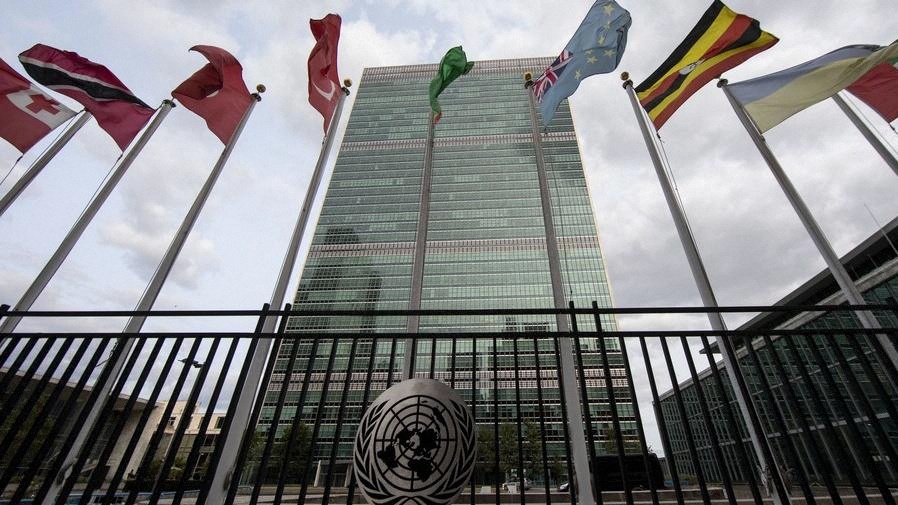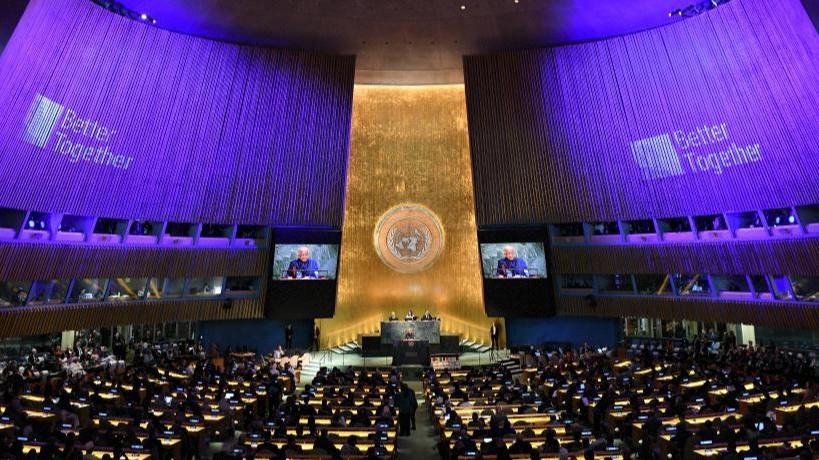
The United Nations headquarters in New York, the United States. September 14, 2020[Photo/Xinhua]
As it marks its 80th birthday on October 24, the United Nations (UN) is under mounting challenges. We are told that by failing to prevent war, it has failed to answer to its raison d'etre; that its agencies are reportedly riddled with corruption and corporate influence; that it was always unrepresentative; and that reform appears next to impossible.
These problems are real. However, some of its formative features, often forgotten in contemporary discourse, have poised the UN not for demise but for a renaissance. The reason is the UN Charter, which also celebrated its 80th anniversary since its signing on June 26, 1945. It carries the anti-imperialist content of the historical moment of 1945.
While victors may normally write the history of wars, this has not been true of World War II (WWII). Thanks to the Cold War and the still-substantial power of the imperialist countries, Eurocentric narratives of how the U.S. and Europe won WWII, vanquishing the scourges of Nazism and Japanese militarism, have dominated.
However, multipolarity, in particular the rise of China and the stabilization of Russia, is undermining that power and those narratives. This was particularly clear earlier this year when the Russian Federation and the People's Republic of China marked their indispensable roles in winning WWII in the European theater and as the main Eastern battlefield, respectively, in major celebrations and military parades in May and September.
The two countries' grandeur was a fitting tribute to the sacrifice of 27 million and 35 million lives respectively and reminding the world of the most ironic fact of 20th century history: a crisis caused by capitalist countries and their imperialism could not be solved without Soviet and Chinese forces, along with colonial forces.

United Nations General Assembly special session to commemorate the 80th anniversary of the founding of the UN at its headquarters in New York, September 22, 2025. [Photo/Xinhua]
World War I (WWI) was not caused by Germany and its expansionism, as alleged by the victors who met at the Palace of Versailles, but, as the more scrupulous historians argue, by the inter-imperial competition between all the major capitalist powers. That is why the end of WWI proved only a temporary pause, and war resumed 20 years later.
If the crisis was caused by the rivalry of all the major powers, the defeat of one of them, Germany, by the others was never going to solve anything and the Treaty of Versailles only became a continuation of these rivalries, sowing the seeds of WWII. That war could provide a lasting resolution chiefly because of the role of new forces in it.
That is why, unlike the League of Nations, which sought only to stop war among imperialist countries while they continued, and even extended, through the Mandates system, their imperial domination, the UN Charter embodied entirely new principles that cut across imperialism. They include the sovereign equality of all members, including that of the vast majority of UN members which achieved independence from colonial domination after 1945 and took UN membership from 51 in 1945 to 193 today; the resolution of international disputes by peaceful means; forsaking the threat or use of force against the territorial integrity or political independence of any state; and non-interference in the domestic jurisdiction of states. This last provision amounts to the endorsement of the economic sovereignty of every country, precisely what imperialism wishes to negate and development requires.
While imperialism remained powerful enough to compromise the most fundamental principle of sovereign equality by creating a Security Council with five permanent members with vetoes, they had to include in their number the Soviet Union and China and the absurd folly of assigning China's seat to the Taiwan region had, eventually, to be abandoned too.
Developing this formative anti-imperialist content must be the new mission of a renascent UN. It is not that the UN has not prevented wars, but that the U.S.-led West, the world's chief warmonger, has resorted to the North Atlantic Treaty Organization (NATO) to wage wars not permitted by the UN. This problem will only be solved by the further diminution of the power of the West, which is ongoing. The same Western decline can also make efforts to make the UN more representative, easier and less influenced by Western corporations.
The UN, with its charter principles, is the necessary foundation of the further advance of multipolarity. China has always encouraged adherence to it, whether by its Five Principles of Peaceful Co-existence or by its slew of new initiatives, for global security, global development, or global governance, all working within its spirit.



